热门标签
热门文章
- 1关于Unity3D打包Android Studio项目及二次开发_unity 打包的安装包 怎么进行二次开发
- 2nodejs项目实战(带源码)_nodejs项目源码
- 3elastic search 分布式主从配置和遇到的一些坑_elastic改了 -xms -xmx后未生效
- 4基于图像的多视角立体视觉三维重建(一)——对极几何模型与极线校正原理_对极几何校正
- 5VUE3 引入 Element-UI_vue3 引入element
- 6打印并实现分页_print分页印章
- 7使用obi fluid进行洪水模拟,持续更新~_unity 洪水推进
- 8基于Unity的VR迷宫游戏项目技术分享_unity3d迷宫游戏
- 9JavaScript(JS)获取元素、改变元素的内容、修改属性_js获取元素修改属性值的方法
- 10多线程中使用COM组件时的初始化问题_windows 多线程 com
当前位置: article > 正文
飞天使-k8s知识点20-kubernetes实操5-pod更新与暂停-statefulset
作者:不正经 | 2024-02-22 03:08:38
赞
踩
飞天使-k8s知识点20-kubernetes实操5-pod更新与暂停-statefulset
资源调度 Deployment:扩缩容
扩容和缩容,常用的功能 scale [root@kubeadm-master1 ~]# kubectl scale --help Set a new size for a Deployment, ReplicaSet, Replication Controller, or StatefulSet. Scale also allows users to specify one or more preconditions for the scale action. If --current-replicas or --resource-version is specified, it is validated before the scale is attempted, and it is guaranteed that the precondition holds true when the scale is sent to the server. Examples: # Scale a replicaset named 'foo' to 3. kubectl scale --replicas=3 rs/foo # Scale a resource identified by type and name specified in "foo.yaml" to 3. kubectl scale --replicas=3 -f foo.yaml # If the deployment named mysql's current size is 2, scale mysql to 3. kubectl scale --current-replicas=2 --replicas=3 deployment/mysql # Scale multiple replication controllers. kubectl scale --replicas=5 rc/foo rc/bar rc/baz # Scale statefulset named 'web' to 3. kubectl scale --replicas=3 statefulset/web 实操部分 [root@kubeadm-master1 ~]# kubectl get rs NAME DESIRED CURRENT READY AGE nginx-deploy-845964f5bf 4 4 4 61m nginx-deploy-968b78ccf 0 0 0 41m nginx-deployment-67dfd6c8f9 1 1 1 56d tomcat-deployment-6c44f58b47 1 1 1 56d [root@kubeadm-master1 ~]# kubectl get pod NAME READY STATUS RESTARTS AGE client 1/1 Running 0 50d my-pod 1/1 Running 0 9d my-pod1 0/1 Completed 6 20h net-test1 1/1 Running 138 57d net-test2 1/1 Running 14 57d nginx-deploy-845964f5bf-dqdzt 1/1 Running 0 6m33s nginx-deploy-845964f5bf-k8vbj 1/1 Running 0 6m35s nginx-deploy-845964f5bf-pxs78 1/1 Running 0 10s nginx-deploy-845964f5bf-xk49f 1/1 Running 0 6m34s nginx-deployment-67dfd6c8f9-5s6nz 1/1 Running 1 56d tomcat-deployment-6c44f58b47-4pz6d 1/1 Running 1 56d [root@kubeadm-master1 ~]# kubectl scale --replicas=2 deploy nginx-deploy deployment.apps/nginx-deploy scaled [root@kubeadm-master1 ~]# kubectl get rs NAME DESIRED CURRENT READY AGE nginx-deploy-845964f5bf 2 2 2 61m nginx-deploy-968b78ccf 0 0 0 41m nginx-deployment-67dfd6c8f9 1 1 1 56d tomcat-deployment-6c44f58b47 1 1 1 56d [root@kubeadm-master1 ~]# kubectl get pod NAME READY STATUS RESTARTS AGE client 1/1 Running 0 50d my-pod 1/1 Running 0 9d my-pod1 0/1 Completed 6 20h net-test1 1/1 Running 138 57d net-test2 1/1 Running 14 57d nginx-deploy-845964f5bf-k8vbj 1/1 Running 0 7m1s nginx-deploy-845964f5bf-xk49f 1/1 Running 0 7m nginx-deployment-67dfd6c8f9-5s6nz 1/1 Running 1 56d tomcat-deployment-6c44f58b47-4pz6d 1/1 Running 1 56d
- 1
- 2
- 3
- 4
- 5
- 6
- 7
- 8
- 9
- 10
- 11
- 12
- 13
- 14
- 15
- 16
- 17
- 18
- 19
- 20
- 21
- 22
- 23
- 24
- 25
- 26
- 27
- 28
- 29
- 30
- 31
- 32
- 33
- 34
- 35
- 36
- 37
- 38
- 39
- 40
- 41
- 42
- 43
- 44
- 45
- 46
- 47
- 48
- 49
- 50
- 51
- 52
- 53
- 54
- 55
- 56
- 57
- 58
- 59
- 60
- 61
- 62
- 63
- 64
- 65
- 66
- 67
资源调度 Deployment:更新的暂停与恢复
kubectl rollout pause 和 kubectl rollout resume 的详细示例。 假设你有一个名为 my-deployment 的 Deployment,它运行的是 my-app:v1 的镜像。你想要把镜像更新为 my-app:v2,但是你希望在更新之前先暂停 Deployment,以便进行一些配置的修改。 首先,用以下命令暂停 Deployment: kubectl rollout pause deployment/my-deployment 然后,你可以修改 Deployment 的配置。比如,你可以用以下命令更换镜像: kubectl set image deployment/my-deployment my-app=my-app:v2 此时,即使你修改了 Deployment 的配置,也不会触发新的滚动更新,因为 Deployment 正处于暂停状态。 当你准备好进行更新时,你可以用以下命令恢复 Deployment: kubectl rollout resume deployment/my-deployment 恢复后,Deployment 控制器会开始新的滚动更新,使用你新设置的 my-app:v2 镜像。
- 1
- 2
- 3
- 4
- 5
- 6
- 7
- 8
- 9
- 10
- 11
- 12
- 13
- 14
- 15
- 16
- 17
- 18
资源调度 StatefulSet:定义一个有状态服务
- 1
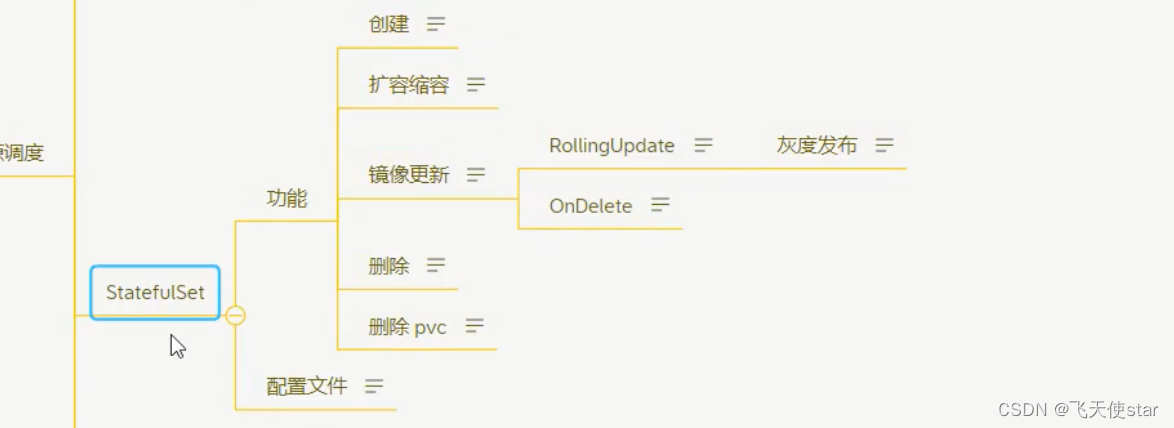
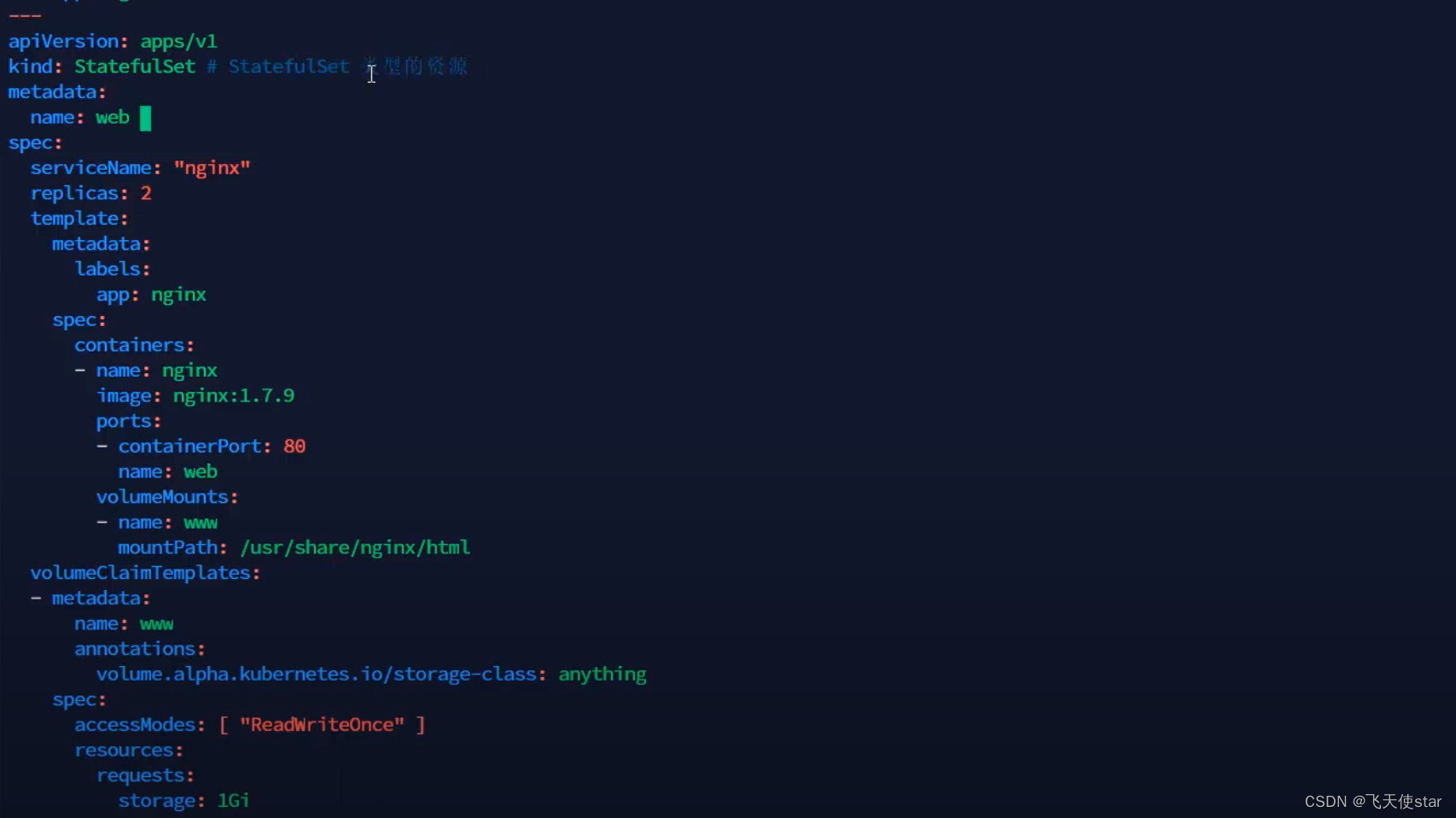
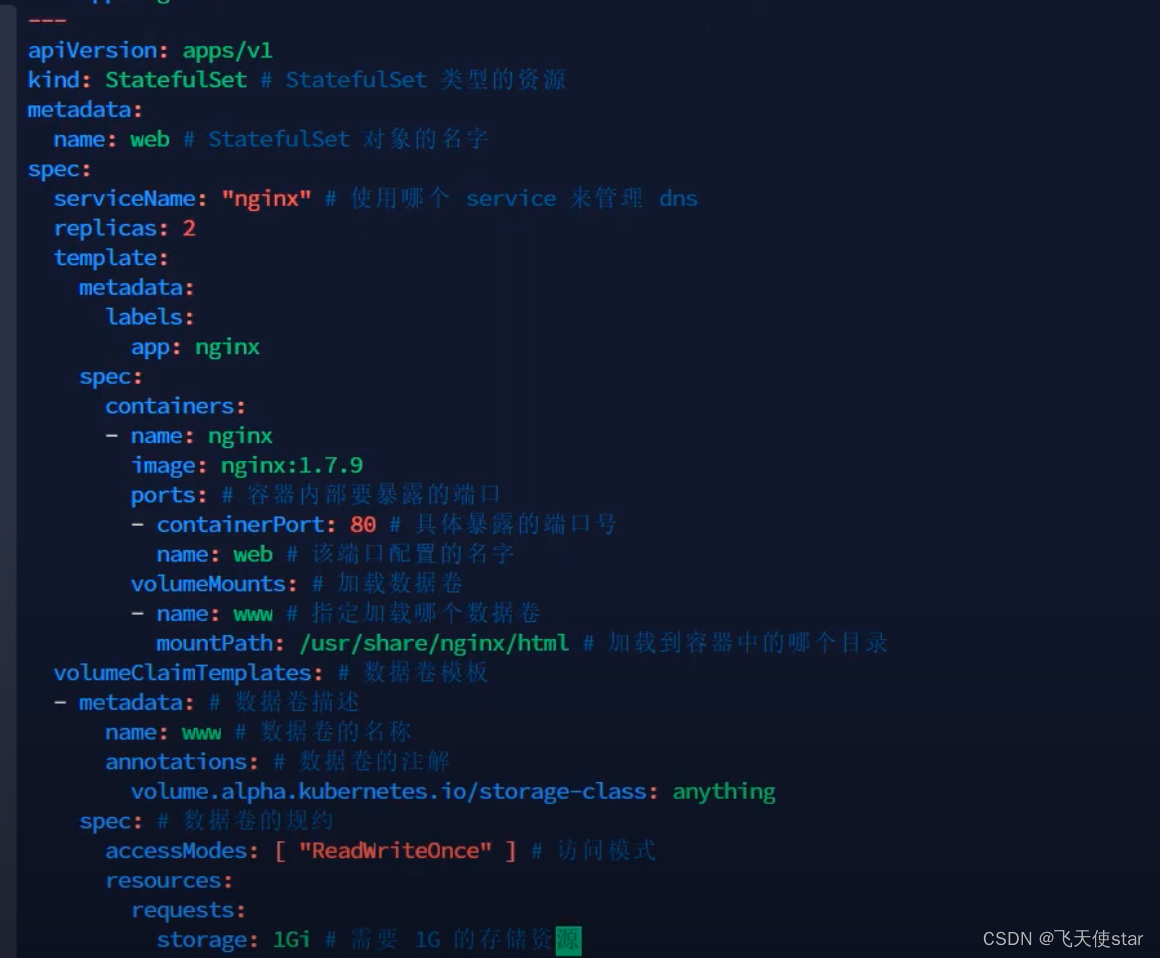
Kubernetes提供了StatefulSet来解决这个问题,其具体如下:
StatefulSet给每个Pod提供固定名称,Pod名称增加从0-N的固定后缀,Pod重新调度后Pod名称和HostName不变。
StatefulSet通过Headless Service给每个Pod提供固定的访问域名。
StatefulSet通过创建固定标识的PVC保证Pod重新调度后还是能访问到相同的持久化数据。
- 1
- 2
- 3
- 4
- 5
- 6
- 7
- 8
- 9
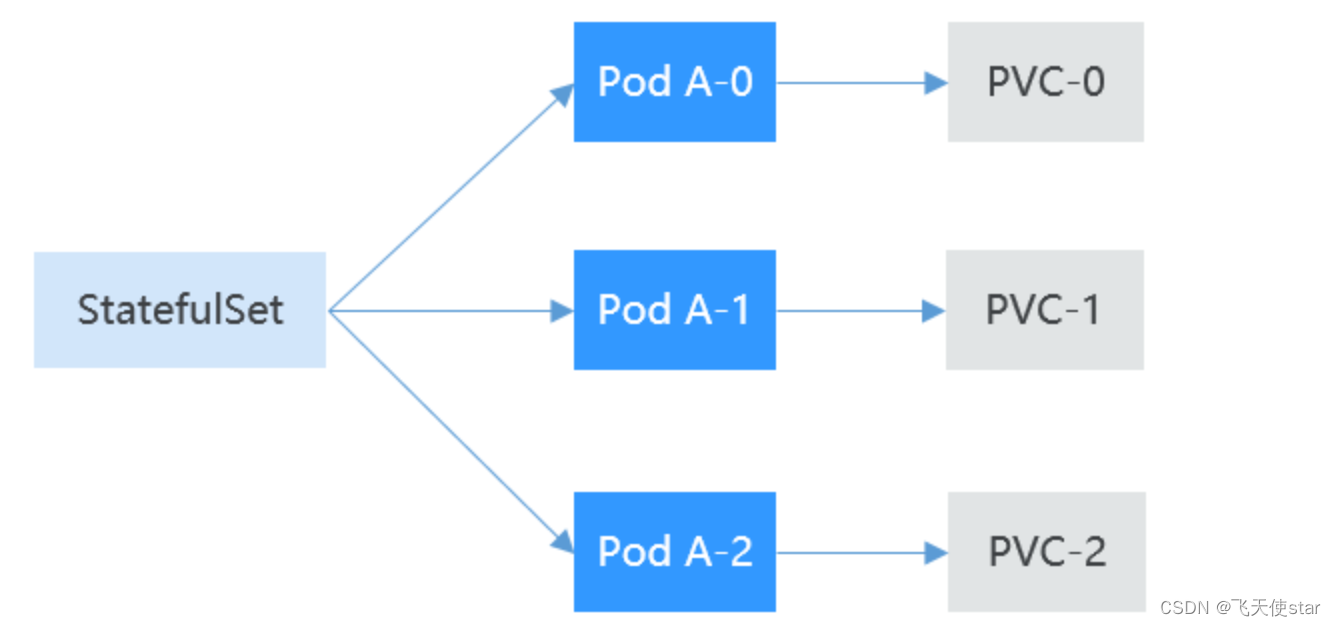
headless service
PersistentVolume (PV) 和 PersistentVolumeClaim (PVC) 都是 Kubernetes 中用于管理存储的资源,但它们的角色和用途有所不同。 PersistentVolume (PV) 是集群中的一部分存储,它被管理员提前配置好。这可以是节点内部的某个目录,如一个本地路径(在单节点的测试环境中常见),或者是某种网络存储,如 Google Compute Engine persistent disk,AWS Elastic Block Store volume,NFS mount,或者其他存储系统。PV 是集群资源,与 Pod 的生命周期无关,即使使用 PV 的 Pod 被删除,PV 也会保留其数据。 PersistentVolumeClaim (PVC) 则是用户在 PV 中申请存储空间的请求。PVC 可以请求特定大小和访问模式的 PV。例如,用户可以请求一个大小为 10Gi 和 ReadWriteOnce 访问模式的 PV。Kubernetes 会寻找一个匹配的 PV 并将其绑定到 PVC。 简单来说,PV 是代表集群中的实际存储空间,而 PVC 是 Pod 对这个存储空间的需求或请求。 Statefulset的YAML定义与其他对象基本相同,主要有两个差异点: serviceName指定了Statefulset使用哪个Headless Service,需要填写Headless Service的名称。 volumeClaimTemplates是用来申请持久化声明PVC ,这里定义了一个名为data的模板,它会为每个Pod创建一个PVC,storageClassName指定了持久化存储的类型,在PV、PVC和StorageClass会详细介绍;volumeMounts是为Pod挂载存储。当然如果不需要存储的话可以删除volumeClaimTemplates和volumeMounts字段。
- 1
- 2
- 3
- 4
- 5
- 6
- 7
- 8
- 9
- 10
- 11
- 12
- 13
- 14
- 15
- 16
- 17
- 18
- 19
金丝雀发布
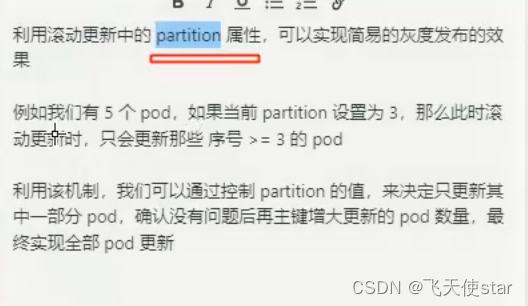
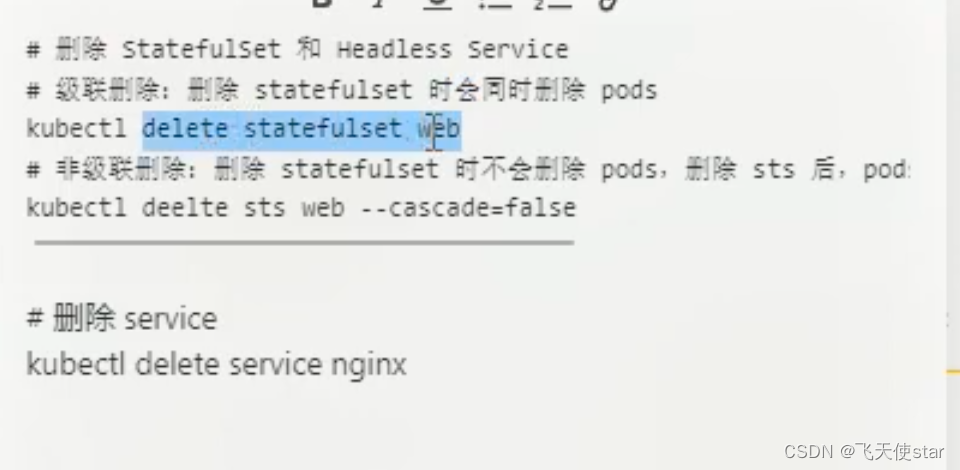
参考文档:https://support.huaweicloud.com/basics-cce/kubernetes_0015.html
声明:本文内容由网友自发贡献,不代表【wpsshop博客】立场,版权归原作者所有,本站不承担相应法律责任。如您发现有侵权的内容,请联系我们。转载请注明出处:https://www.wpsshop.cn/w/不正经/article/detail/128269
推荐阅读
相关标签



